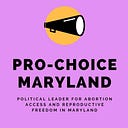Pregnancy is hard, but it’s even harder while incarcerated. Doulas can make it easier.
by Caitlyn Stachura
As a disclaimer on the language used here, pregnancies aren’t exclusive to people who identify as women. Little data exists on pregnant transgender and non-binary folks in correctional facilities in the U.S. For the sake of this post and based on the available statistics, the word ‘women’ is used to identify incarcerated pregnant people.
Pregnancy and birth are stressful to begin with, but these experiences during incarceration bring about an onset of unique anxieties and adverse outcomes to expecting mothers in correctional facilities across the U.S. With no federal mandates or oversight on the quality of maternal healthcare during incarceration, incarcerated pregnant women are left at the jurisdiction of their correctional facility to determine what their childbirth experience will look like. In Maryland, this is quite literally isolating and has tangible emotional implications on the mother and, therefore, the baby. Women are often alone with the exception of medical staff and the officers that remain with them in the hospital room; no family nor friends permitted. A proven, data-driven alternative to this environment already exists in several other states and in our own Maryland Correctional Institute for Women (MCIW): allow doulas, professionals trained in providing emotional support around childbirth, to accompany incarcerated women throughout their pregnancy and during the post-partum period.
The work of the Baltimore Doula Project (BDP), the organization responsible for providing doula care in MCIW, can be broken down into three facets. Namely, the doulas aid with physical, emotional, and educational support. Although the doulas are prohibited from providing physical touch like therapeutic massage to the incarcerated women, they’re able to recommend stretching techniques that help ease aches and pains associated with pregnancy. Emotionally, doulas create safe spaces for pregnant and post-partum women to share their birth stories and facilitate peer-to-peer support groups inside the prison. Clare Donofrio of the Baltimore Doula Project describes these groups as BDP’s “greatest success” in that the women not only feel heard and cared for, but can learn from each other, too. The learning opportunities that doulas present to incarcerated women is essential when our sex education across the United States is so lacking. To put it bluntly, women don’t always know what they’re expecting, nor do they necessarily have the resources the avoid unwanted pregnancy.
This is even more so true for the low-income Black and Brown women from disenfranchised, underfunded communities who are disproportionately incarcerated in our criminal justice system. Without access to their communities on the outside or even the internet, doulas are needed to fill these gaps and ease health-related fears by advising in areas like safe sex, consent, and the physiological processes of pregnancy. Donofrio mentions that in her experiences as a prison doula, she had encountered several women who already had 3–4 children and have little knowledge on family planning, including contraception methods. Not being listened to in a doctor’s office (especially for non-white folks) is unfortunately a familiar experience given the nature of our Western, unholistic medical model, and this is especially applicable to correctional facilities that lack the infrastructure to provide comprehensive medical care. How are pregnant incarcerated women expected to get answers to their reproductive healthcare questions from their prison’s medical staff when they’re not being listened to in the first place? Here, doulas act as an outlet to listen to these concerns and give counsel.
Donofrio explains the necessity of doula care in prisons at its core: “It’s important for folks who are behind bars in the same way that it’s important for everyone.” Granted, the reasons why women are giving birth in prisons are systemic. A 2013 study conducted by the Bureau of Justice Assistance show us that women’s pathway to incarceration is majorly connected to their own victimization at some point in their lives. The same study found that 90% of a sample of incarcerated women “reported physical and sexual violence from their partners in the year prior to incarceration, and that many women described polyvictimization throughout their lifetime, including chronic and severe abuse.” By considering these factors that lead to incarceration — from racism to interpersonal violence — and subsequently the adverse pregnancy outcomes in correctional facilities, it becomes clear that the trauma-informed care that doulas provide is a necessity for incarcerated women.
Based on a first-of-its-kind study published in 2019, an average of 4 to 8% of women are pregnant while incarcerated at any point in time, meaning there are close to 3,000 admissions of pregnant women to state and federal prisons each year. Statistically, these numbers can seem relatively insignificant in the picture of mass incarceration. The thing is, these numbers don’t just exist in the abstract. They’re women who should be humanized and treated with dignity. When we enlist the help of doulas in prisons, we ensure more healthy pregnancies and work to return back to incarcerated women the autonomy they deserve.
